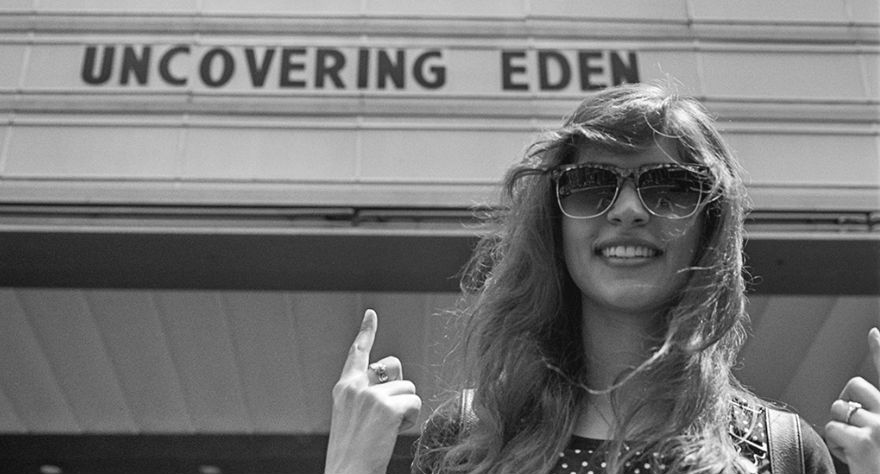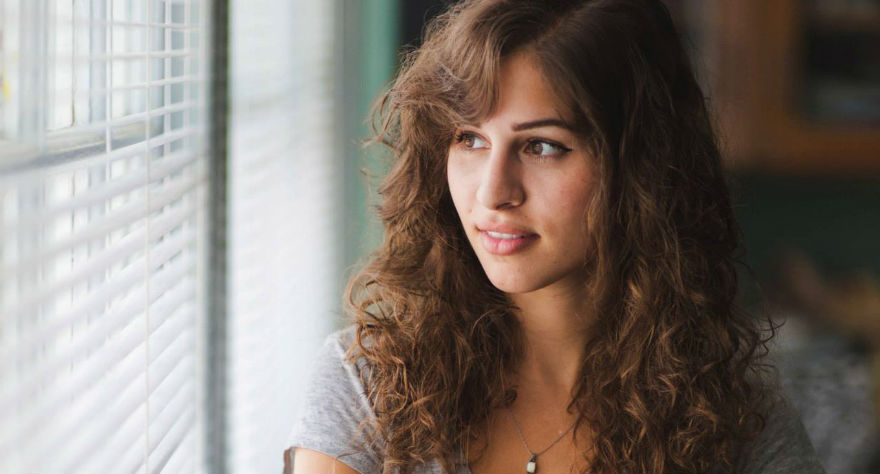Chelsea Lupkin Talks ‘Uncovering Eden’, Embracing Jewish Identity

A budding filmmaker with a wide range of artistic aspirations, Chelsea Lupkin has an intensely personal, lyrical style. Her short film Uncovering Eden, about a teenage girl (played by Victoria Pedretti) grappling with her Jewish heritage, was largely inspired by Lupkin’s own experiences dealing with people bullying her for being Jewish. It’s a form of discrimination sorely unrepresented in cinema. Lupkin’s short is a sobering parable as well as a textured representation of Jewish identity.
I spoke with Lupkin about Uncovering Eden, her experiences with bullying growing up, and her long-term plans for her career as a filmmaker.
You can watch Uncovering Eden now on Vimeo
.

Tell me a bit about your background. How did you get into filmmaking?
I’m actually a shooter for MTV News. I went to a fine arts school, Carnegie Mellon. I really thought I was going to get into illustration, but then I realized…I kinda suck at this. [laughs] I actually moved into video performance art and creating stories with video. I was in a couple of classes that gave me the opportunity to perform at the Warhol museum. There are a lot of great drama students there, so I was like, “Hey guys…wanna be in my movies!”
Let’s gauge your taste in film. Who are some of your favorite directors? Films?
I really like filmmakers that have a cinematic voice. I like Edgar Wright. I think he’s really smart with his camera work and how he tells his stories. I think camera movements should be a tool to convey an idea. I think he’s really good at that, whether it be with his little montages or his close-ups, stuff that really emphasizes different things. Wes Anderson’s great, too. Those two have inspired me, and I’m a huge Sam Raimi fan, too. I really love Evil Dead! I’m actually finishing up another short and I’m starting my first horror movie now, so that should be interesting. I don’t want to lump myself into a particular genre; I want to test all different kinds of things. I like everything, so I’m just going to write stories that entertain me.
Let’s talk about Uncovering Eden. Even though it’s a short, this girl goes through a lot, and you tackle some pretty big social issues.
I think all of the characters in the film are afraid of something, and that fear drove the plot. Edie’s afraid of not fitting in and not being accepted, but at the same time you have Darren and these other characters who also feel like they have to fit into certain ideals. I wanted to address what [would result of that] in societal terms. I don’t think anyone intentionally meant to hurt me when I was growing up, but a lot of people would point out that I was Jewish and giggle about it. It started to really drive me nuts. I stopped telling people that I was going home to celebrate passover or Hanukkah. It made me feel different. I went to public school, but I was one of the minorities. I wanted to talk about that, especially considering that other minority groups have a lot more attention: gender issues, racial issues, even other religions like Muslims. They’re in the spotlight, and sometimes people forget that Jewish people are actually still picked on. It might not be in the same way, but we are. One of the interesting pieces of feedback about the film is the question of whether [bullying against Jews] actually happens. It does. I wanted to exaggerate that in the film. I wanted to talk about identity.
You said something interesting there. You wanted to exaggerate the portrayal of Jewish bullying?
Yeah. There’s a library scene where you see the kids pick on other people. They could have been picking on people for anything, but because this is a short film, I had to get my point across quickly. I wanted to only show things that dealt with Edie and her personal crisis. That’s the most important thing. She gets picked on, and we only see her getting picked on.
The movie’s opening, with Edie on the phone with 911 in a panic, really sets the tone and lends the film a lot of tension.
I knew that I was going to make a dark film, and I figured I didn’t want to surprise people later. I wanted to bring them in and talk about it quickly. With short films you have to get across what your story is about in 30 seconds. I wanted to be a bit ambiguous to keep people watching, so I don’t let you know what the phone call is about.
The scenes where Edie is being short with her grandmother are really heartbreaking. It’s hard to hear her talk to her grandma that way, and unfortunately it’s a pretty familiar scenario if you’ve ever been an angsty teenager.
There’s a scene later where her grandmother asks her if the way she’s acting has anything to do with her friends. That scene was really important to me. When Edie says, “You’re not my dad,” you sort of get the idea that her grandmother uses their Jewish heritage as a way of teaching Edie moral values. Unfortunately, Edie’s getting picked on at school for being Jewish. Now, we don’t know if she’s getting picked on all the time, but I knew she was going to reject any kind of Jewish influence. I felt that was really important.
I’m going to level with you: I didn’t know people still picked on others for being Jewish.
There have been people who’ve said, “No, this doesn’t happen.” Well, I’ll tell you what: When I was sixteen, I was part of a lot of different theater troupes, and when we’d go to different conferences, I’d run into Jew joke so many times it was ridiculous. Sometimes it’s malicious, and sometimes they’re middle-Americans who think Jews have devil horns. Are you kidding? That influenced me. I went on a choir tour when I was younger, and there was this Welsh boy who was flirting with me on this ferry ride. I was looking for Euros to figure out if I had enough to get a pastry, and my American friend said, “Oh, that’s so Jewish of you,” implying that I was digging for change, which was lame and juvenile. The Welsh kid said, “You’re Jewish?” I said, “Yeah,” and he turned his body away from me and didn’t talk to me for the rest of the trip. With the movie, I wanted to say that this is still an issue. I feel like people should be talking about it.
I connected with your film because I’m Asian and experience racism all the time, but typically the person has no idea they’re being insulting. It’s a subtle thing, and I think that’s the kind of prejudice that hurts the most, because no one talks about it.
Thank you. The characters in the movie who take a prank too far…none of them are really going out of their way to hurt anybody. I had to keep the ending dark because I wanted to leave people feeling something, whether they were angry or sad or confused. I feel like the general reactions I’ve gotten have been, “I’ve taken something from this movie,” and whether it was good or bad, I made people feel. That’s important to me. And they could be saying, “This is a shit movie!” but at least they’re feeling emotion.
What’s coming up next for you?
I’m finishing up a coming-of-age story called Sophie Learns to Swim. It’s really light and fun. We shot it last summer, and we’re in color and sound now. I’m in pre-production for my first dark comedy-meets horror movie. I’m starting to find my voice as a filmmaker, so that’s why I don’t want to limit myself to one genre. Some YouTubers I know say, “My fans expect this, so I’m going to deliver its.” Well, I don’t want to do that. I just want to make things that allow me to grow. Only seven percent of the movie industry’s directors are female. I think 2.2 percent are producers. I’m actually a shooter at MTV, and that’s been interesting, because there aren’t a lot of female shooters. I want to make films that have strong female characters, and I felt like I did that with Uncovering Eden.
